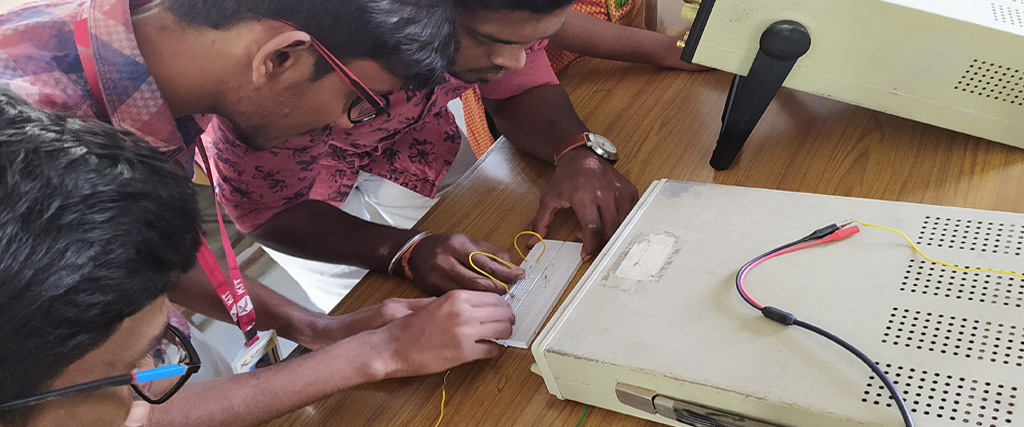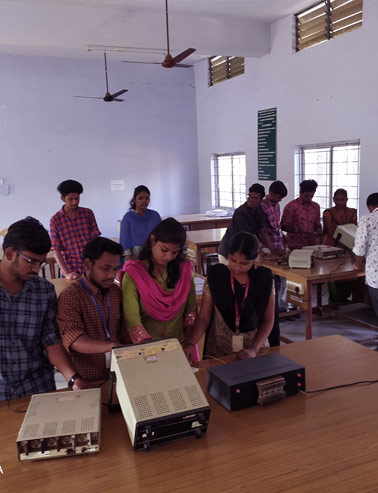To produce technically competent Electrical and Electronics Engineering Graduates with high social and ethical values to meet the growing needs of society.
The department of Electrical & Electronics Engineering, one of the prestigious departments in Karpagam Institute of Technology was started in the year 2008. The department provides Bachelor’s programme in Electrical & Electronics Engineering for 4 years. The EEE department aims at providing skill based training along with the curriculum in the college to bring out strong, competent students of engineering with sound knowledge in the field of Electrical and Electronics Engineering for a better future.
Students of EEE are motivated to participate in extra-curricular and several co-curricular activities like project expo in various domains, paper presentations, workshops, national and international level seminars. The EEE department provides internships, trainings, and industrial visits for students every year. MoU’s have been signed by the EEE department with number of companies to provide Industrial Certification Training to the student’s right here on the Campus. The department also provides GATE and IES coaching for students who wish to pursue higher education in Tier-I colleges and for those who are preparing for Central Government jobs.

- Establishing state-of–the-art facilities in the field of Electrical and Electronics Engineering and enriching knowledge of the faculty through continuous improvement process.
- Creating conducive teaching learning environment for innovations and professional activities.
- Inculcating ethical and social values through co-curricular and extra-curricular activities.
- PEO1: Graduates will have successful careerby their ability to contribute in the field of Electrical and Electronics Engineering and interdisciplinary areas.
- PEO2: Graduates will apply their knowledge and skills to provide solutions to Electrical and Electronics Engineering problems in industries.
- PEO3: Graduates will engage in life-long learning and work as a team with high social and ethical values in their professional career.
PROGRAM OUTCOMES
- PO1: Engineering knowledge: Apply the knowledge of mathematics, science, engineering fundamentals, and an engineering specialization to the solution of complex engineering problems.
- PO2: Problem Analysis: Identify, formulate, review research literature, and analyze complex engineering problems reaching substantiated conclusions using first principles of mathematics, natural sciences, and engineering sciences.
- PO3: Design/development of solutions: Design solutions for complex engineering problems and design system components or processes that meet the specified needs with appropriate consideration for the public health and safety, and the cultural, societal, and environmental considerations.
- PO4: Conduct investigations of complex problems: Use research-based knowledge and research methods including design of experiments, analysis and interpretation of data, and synthesis of the information to provide valid conclusions.
- PO5: Modern tool usage: Create, select, and apply appropriate techniques, resources, and modern engineering and IT tools including prediction and modeling to complex engineering activities with an understanding of the limitations.
- PO6: The engineer and society: Apply reasoning informed by the contextual knowledge to assess societal, health, safety, legal and cultural issues and the consequent responsibilities relevant to the professional engineering practice.
- PO7: Environment and sustainability: Understand the impact of the professional engineering solutions in societal and environmental contexts, and demonstrate the knowledge of, and need for sustainable development.
- PO8: Ethics: Apply ethical principles and commit to professional ethics and responsibilities and norms of the engineering practice.
- PO9: Individual and team work: Function effectively as an individual, and as a member or leader in diverse teams, and in multidisciplinary settings.
- PO10: Communication: Communicate effectively on complex engineering activities with the engineering community and with society at large, such as, being able to comprehend and write effective reports and design documentation, make effective presentations, and give and receive clear instructions.
- PO11: Project management and finance: Demonstrate knowledge and understanding of the engineering and management principles and apply these to one‘s own work, as a member and leader in a team, to manage projects and in multidisciplinary environments.
- PO12: Life-long learning: Recognize the need for, and have the preparation and ability to engage in independent and life-long learning in the broadest context of technological change.
- PSO1: Design, Develop and Implement electrical technologies to meet the industrial demands and provide effective solution to the real world problems.
- PSO2: Apply technical knowledge to solve issues in the areas of Power Generation, Transmission, Conversion and Distribution.
- PSO3: Apply knowledge to design and analyse power electronics systems in advanced power applications, renewable energy and modern electrical drives.
- ELECTRICAL MACHINES LAB
- POWER ELECTRONICS LAB
- CONTROL AND INSTRUMENTATION LAB
- POWER SYSTEM SIMULATION LAB
- RENEWABLE ENERGY SYSTEMS LAB
- ENGINEERING PRACTICES LAB
The MoU’s are made with various industries to reduce the gap with industry. The MoU’s are made with
- Object Automation Software Solutions Private Limited
- Greenstan Technologies
- Prime Tech Instruments
- Novitech R&D Private Limited
- Profenaa Technologies
- MAS Solar Systems Private Limited
- Sri Sabari Industries
- Industrial Electronics Corporation
- Prolific Systems and Technologies Private Limited

